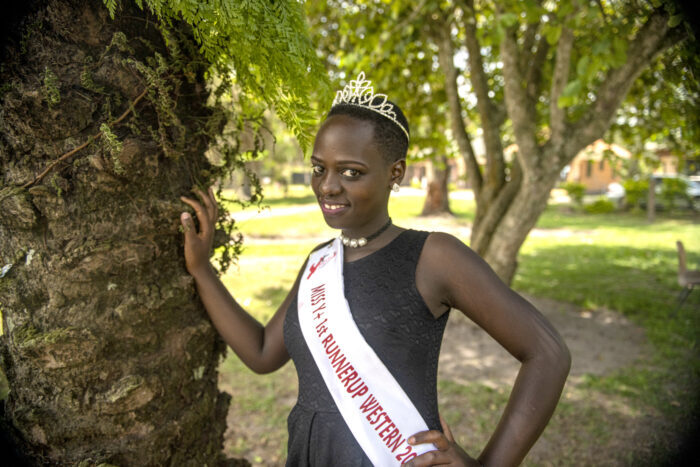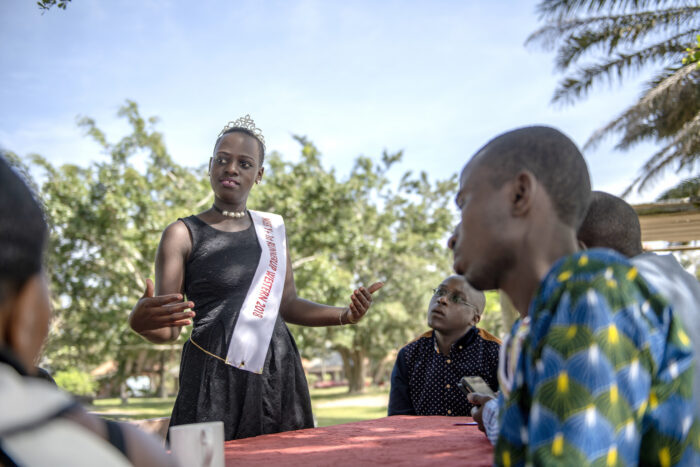 Hajarah Asiimwe is a 22-year-old HIV activist and community health care worker living in southwest Uganda. She is an Ariel Ambassador with the Elizabeth Glaser Pediatric AIDS Foundation (EGPAF), a leadership position from which she looks out for the welfare of fellow adolescents and young adults. An expressive actor, Hajarah is known for her roles in skits at community gatherings in which she and other activists educate their peers about HIV prevention and medication, sexual and reproductive health, and gender-based violence.
Hajarah Asiimwe is a 22-year-old HIV activist and community health care worker living in southwest Uganda. She is an Ariel Ambassador with the Elizabeth Glaser Pediatric AIDS Foundation (EGPAF), a leadership position from which she looks out for the welfare of fellow adolescents and young adults. An expressive actor, Hajarah is known for her roles in skits at community gatherings in which she and other activists educate their peers about HIV prevention and medication, sexual and reproductive health, and gender-based violence.
Before the COVID-19 pandemic, Hajarah participated in on-site community dialogues and education sessions. However, the past year has been a challenge due to restricted gatherings and movement. The local public health focus has shifted to averting the spread of COVID-19.
Hajarah says that response to the coronavirus has, unfortunately, shrunk the safe space for dialogue and community education. This may contribute to the rise of teenage pregnancies, rape, and poor adherence to antiretroviral therapy (ART).
Before the COVID-19 pandemic, Hajarah participated in on-site community dialogues and education sessions. However, the past year has been a challenge due to restricted gatherings and movement.
Nonetheless, Asiimwe has done her best to keep in touch with many of her peers who are living with HIV.
“I have been following up with some people in Bushenyi [a nearby town],” says Hajarah. “The difficulty is that I was unable to travel there during lockdown. Even when the restrictions on transport were made less severe, the transport fares are still high.
“But I am able to use my phone to keep in touch with my peers. This extends counseling to them and an encouragement to continue to adhere to ART. I am also encouraging them to reach out to others and continue the fight against the spread of HIV and AIDS in their communities.
“I found there was a problem of depression during the lockdown,” Hajarah continues. “I used this opportunity to do initiatives on mental health reconstruction through phone calls, SMS [text messages], and social media. I counsel approximately 15 people, and they are now doing better.
“However, I felt that this was only rebuilding people temporarily. I decided to start blogging so that locally produced content on mental health, HIV/AIDS prevention, and teenage pregnancies can be found over the long term. I started to do online advocacy, such as Q&A sessions on Twitter using the hashtag #DoYouKnowYourHIVStatus.”
“I found there was a problem of depression during the lockdown. I used this opportunity to do initiatives on mental health reconstruction through phone calls, SMS, and social media.” Hajarah Asiimwe
While Hajarah works hard to provide counseling and community-based services for fellow young people living with HIV, but she also knows that she cannot fight HIV alone. Hajarah advocates for her peers by sharing challenges, opportunities, lessons learned, and recommendations with public health leadership.
“The lockdown presented a constraint on transport which affected access to treatment, testing and prevention,” she says. “Therefore, I recommend that health facilities be better prepared to deliver home services home and home or online counseling.”
“I have launched a campaign against transactional sex but there is little [official] information about it. The government should initiate steps to make sure there is information,” Hajarah adds. When women face poverty and lack of support, many turn to sex work as their only viable means of survival, which, can put them at greater risk of experiencing gender-based violence, and of acquiring HIV. “Women should also be empowered economically in order to reduce the reliance on transactional sex.”
On the topic of sexual and reproductive, health, Hajara says that “the government should continue to give out condoms but let it be better quality and larger quantity.”
“There is also a need to create a safe space for those who are accessing ART,” Hajarah adds. “This safe space can be in form of a friendly corner where the clinicians there are only occupied with providing HIV/AIDS services; This reduces the workload on health workers who have to attend to all kinds of people seeking services and increases possibilities of follow up and adherence.”

Hajarah sees health holistically—her personal health is not just about her HIV status, but also speaks to physical activity, mental health, and socio-economic health. Asiimwe took some personal lessons from COVID-19 and shared them with her community:
“I use Tik Tok to conduct yoga sessions. This helped me and those that followed me keep fit.”
“I also learned how important saving is for us. Young people should start to save for contingencies like this,” says Hajarah, who is also the proprietor of Jarrah Fashions. “The world continues to be ill. Pandemics like COVID-19 cannot easily be avoided, but we can prepare for them. We can diversify our income channels with additional business—which many refer to as ‘side hustle’ when in actual sense it is what pays the bills. We cannot save what we don’t have or when we don’t have enough of it.”
Learn more:
https://globalgirlsglow.org/the-consequences-of-covid-19-for-girls-in-uganda/
https://www.globalcitizen.org/en/content/rise-in-teenage-pregnancies-during-kenya-lockdown/




